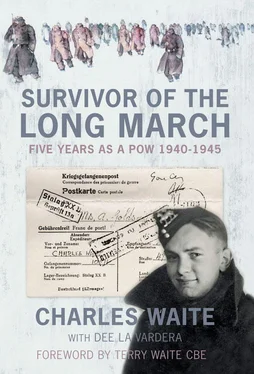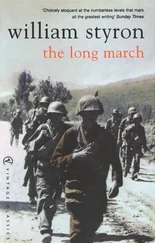I don’t think my family received any of the cards but some survived my journey home. The back of one photograph came in handy, as did the inside pages of my New Testament, to make notes about the things I saw and did on The March. I thought that if I didn’t survive maybe somebody would find the card and know what we had gone through. Postcard from Hell, that’s what it was, I’m afraid, when I read it now:
[March 30]
Two more of our men have passed away. We’re badly in need of food, a bath & clothing. Sid collapsed at work and also others. The guards are inhuman.
[31 March]
Yanks billet bombed.
I am glad this one didn’t get home to my mother.
When I look at the photograph now, I think it was remarkable how clean and tidy we all look, considering what we were going through. We must have made quite a bit of effort to get ourselves looking half-way decent. Rows of us standing at ease or sitting cross legged like children posing for a school photograph. Everybody is looking straight at the camera, putting on a good show for the folks back home. The photographs were taken at the back of the house we were living in, some time in 1941, I think. It looks as though we are sitting in somebody’s back garden, not like a prison camp. They couldn’t get us all in one photo so we were split up but my four pals are together with me on this one picture.
There’s me in the back row with what people call my cheeky grin, probably because I am next to Jimmy who has made a joke about something and made me laugh. I am wearing my non-regulation cap that was made for me by my tailor friend. There is Sid, in the middle row, and Laurie, in the front row, with Heb who doesn’t look at all well. We didn’t know that Hebby had a heart condition and he collapsed on The Long March home. He survived and I saw him once after the war but he died in 1960. And there is a chap named Sargent; you could always see the marks on his tunic where his three stripes had been. So he was actually Sergeant Sargent. You can’t forget that, can you?
I remember it was a few days before we were liberated by the Americans, after our four months on the road, one of the guards was walking down the column of men and struck Sergeant Sargent across the face with the butt of his rifle. There was blood everywhere and Sargent’s nose was broken. Later an American soldier saw the injury and asked Sargent what had happened. When he told him, the American asked if he could identify the guard and Sargent said he could. He was taken to a huge compound where the German soldiers were being held and he was able to identify the man who was then taken away and shot, so I believe. We all felt that justice had been done. The guard got what he deserved.
It was a Polish lad, about sixteen, who came and took our pictures. He was from the Home nearby and was ordered to do the job by the Unteroffizier. I think it must have been on a Sunday, our day off. When he had finished taking the photos, he left us and we never saw him again. The last we heard, three or four days’ later, was that he had been arrested and sent to a concentration camp.
The Home he was staying at was a sort of hostel for young Polish workers which had been built in a field not far from us. We watched the foundations being laid as we passed on our way to work each day, and then the brick walls rising over the next few months. What the Germans did every now and then was to go down a street in the early hours of the morning, knocking on all the doors, and if there were families with children, they would take away all the youngsters, mostly aged 14 to 16 or 17 years (old enough to work). They sent them to these homes all over the region where they stayed and were sent out to work, like us, on neighbouring farms. Extra labour was needed all the time to keep up with the demand for food across the country.
The German authorities, who had built the Home near us, were not bothered about comfort so the building had only the most basic accommodation and facilities. There was no running water or electricity laid on so they used oil lamps. The boys had to collect fuel for the stoves and water from the bowsers or water tankers in the village about 5km away. The girls had domestic duties round the house. There were about 40 children looked after by an elderly Pole, at first, who wore a yellow arm band, and then a couple took over and the woman mainly supervised the girls. It was upsetting to think of those children being in a similar position to us. They were forced to work in the house as well as slaving away on the land and separated from their loved ones. We used to see the boys and girls out on the fields, bent over picking crops or carrying huge baskets of beet or potatoes but never near enough to talk to.
One day a group of us was working near the Home. We were weeding and clearing stones and debris on some land; back breaking work, getting it ready for ploughing. The guards were not around and we were able to stop and have a stretch and a ciggie every so often. I was standing looking at the view, acres and acres of emptiness, when I heard the sound of an engine in the distance. That high-pitched whining noise of an approaching motorbike. I saw a German policeman, in his funny helmet, come up the road and stop outside the building. He parked the motorbike and then walked up to the front door and knocked. He had to wait a minute or two before the woman in charge answered. He had a longish conversation with her on the step, showing her some papers or something, and then she went back inside.
A few minutes’ later, she returned with a young girl, probably about 15 or 16 years old, holding her by the arm. The policeman grabbed the girl with both hands and marched her along the path, out to where his motorbike was standing. She was only a slight girl, wearing a flimsy floral dress and no coat, even though it was a chilly day. He slung her over the petrol tank at the front like a sack of potatoes, got on his bike and, holding her down with one hand, roared off down the road towards a little wooded area.
About ten minutes or so later, I heard the sound of the engine again and looked up. It was the same bike and policeman returning up the road. It stopped and the policeman got off, picked up the girl from the front and dumped her on the road outside the house. Poor thing, you wouldn’t have recognised her from the state she was in. I swear he was laughing as he roared off again back the way he came.
And what had she done to deserve this brutal punishment? We heard later, that all she had tried to do was alter a Brot-Karte – bread card – she had got from one of the lads. She had scratched out a tick on it which showed that the allowance had already been taken. Hunger can drive you to do terrible things, I know, but that was nothing really, hardly what you call a crime. That policeman was wicked behaving like that – a law unto himself, just for his own sadistic pleasure.
Some Germans, the worst kind, laughed and joked while they carried out these attacks. I think they enjoyed it because it was a way of keeping everybody under their control, reminding them who was in charge. They showed you that they could do anything they liked. There was nothing to do but stand by and watch and hate them all the more. The longer the war went on, I felt that it might never end, that these awful things would go on forever and I might never see home again. There was no escape.
It wasn’t any good dwelling on things like this too much. You would go mad if you did and some men did go crazy, not in our camp, thank heavens. We had to keep our spirits up and everybody tried to support each other if they could. No point in giving in or giving up. There was always somebody worse off than yourself.
When we weren’t working, we enjoyed a smoke together, told jokes, and tried to entertain ourselves, all things which broke up the time and relieved the monotony. There was little opportunity to do anything else. Except, every month or so, there was an extra activity which the Unteroffizier offered us in exchange for cigarettes. However, I wasn’t tempted to take on this particular one . I never did latrine duty.
Читать дальше




![Джеффри Арчер - The Short, the Long and the Tall [С иллюстрациями]](/books/388600/dzheffri-archer-the-short-the-long-and-the-tall-s-thumb.webp)







